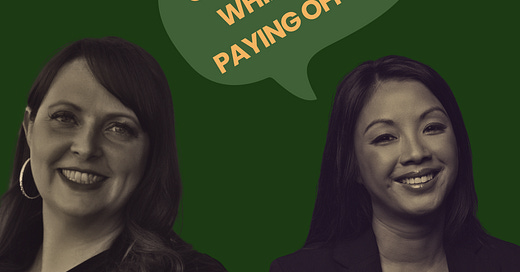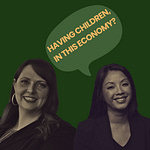There's a whole "order" you're supposed to be following when working toward financial freedom. In fact, some gurus -cough- Dave Ramsey -cough- will tell you that you need to pay off ALL your non-home debt before you start investing. But should you really tackle your lower-rate student loans or other debt before you let compounding returns work in your favor?
We're not so sure. Let's take a look at investing while you have debt and how to decide what to tackle first—or even if you need to choose.
There’s a lot of talk about how you should go about paying down debt and putting off investing for a minute. We look at:
https://www.cnbc.com/2018/10/03/suze-orman-pay-off-debt-asap-and-not-because-it-costs-you-money.html
https://www.bankrate.com/personal-finance/debt/good-debt-vs-bad-debt/
https://www.ramseysolutions.com/debt/pay-off-debt-before-retirement
A quick and dirty look at Miranda’s situation
One of the big things we talk about in the show is the fact that Miranda just went ahead and invested instead of paying down her low-rate student loan debt. Here are some of the deets about the student loan payments:
$53,400 (undergraduate + graduate), consolidation in 2005 for payoff in 2030
$223.79 monthly payment
1.9% interest rate
Using the Student Loan Planner payoff calculator, Miranda could have saved $3,941 by making an extra payment of $100 per month and being done in a little less than eight years.
Instead, by putting that extra $100 per month in the S&P 500 via an index product and reinvesting the dividends, the result is a final value of $66,498.65, not accounting for capital gains taxes, by investing from December 2005 to December 2023. Even subtracting the $4,000 in savings in interest, that’s still coming out ahead by more than $62,000. Miranda still has some years to go before those loans are paid off, so the value is still there. (Calculator used is from DQYDJ.)
If Miranda had started in December 2013, after paying off student loans early, the value of her portfolio with only that $100 extra payment, would have been $22,360.
Miranda’s total interest cost will be $13,724 at the end of 2030. With a total overall value of nearly $53,000 after interest costs are subtracted. But only with gains through December 2023. This doesn’t account for gains through the end of December 2030. Let’s start with $53,000, assume only 7% annualized returns, and $100 a month. According to the Investor.gov calculator, the portfolio value would be close to $95,500.
As it is, Miranda will be Coast FI before the student loans are paid off, and she has invested much more than that extra $100 a month over time. Consider running the numbers on your own, taking into account interest rates and potential returns before deciding to put ALL of your extra money into debt paydown before investing.
Why you might want to invest, even with debt
Investing can help us look forward to the future. We reference the idea of “prospection” and how it can help your mental health.
We also reference a study that indicates 48% of credit card users have to use them for living expenses (https://listwithclever.com/research/average-american-credit-card-debt-2023/), so investing a little bit now can give you something to look forward to while slogging through daily life. Even if you’re just putting a bit of your paycheck into a 401(k).
We reference wages, and how they aren’t keeping up with anything resembling a living wage.
MIT’s living wage calculator: $25.02 per hour, average in the U.S.
Statista: Average hourly wage for all U.S. workers is $11.05
DOL: Federal minimum wage is $7.25
It’s practically impossible to prepare for the future without some type of investing, even if you have debt.
How to decide between investing vs. paying off debt more aggressively
Consider potential annualized returns: Rule of thumb is about 9%, based on S&P 500 returns over the last 25 years (see: https://www.mckinsey.com/capabilities/strategy-and-corporate-finance/our-insights/the-strategy-and-corporate-finance-blog/markets-will-be-markets-an-analysis-of-long-term-returns-from-the-s-and-p-500)
Look at your APR: Debt below 6% might be worth slowly paying down while you invest. Maybe start with debt above 15% APR for aggressive paydown
Create an allocation: Maybe put 90%-95% of your available income toward debt reduction when tackling high-rate debt while still investing 5%-10%. Then, as you get rid of higher-rate debt, shift the allocation, so you’re putting more toward investing with lower-rate debt remaining.
This episode’s financial resource: https://www.britannica.com/money/start-investing-student-loan-debt
Consider supporting us by upgrading to a paid subscription here (so we can continue to keep doing this work)
Or, for a one off donation, buy us a refreshing beverage on Ko-fi.
And make sure you check out our websites as well:














Share this post